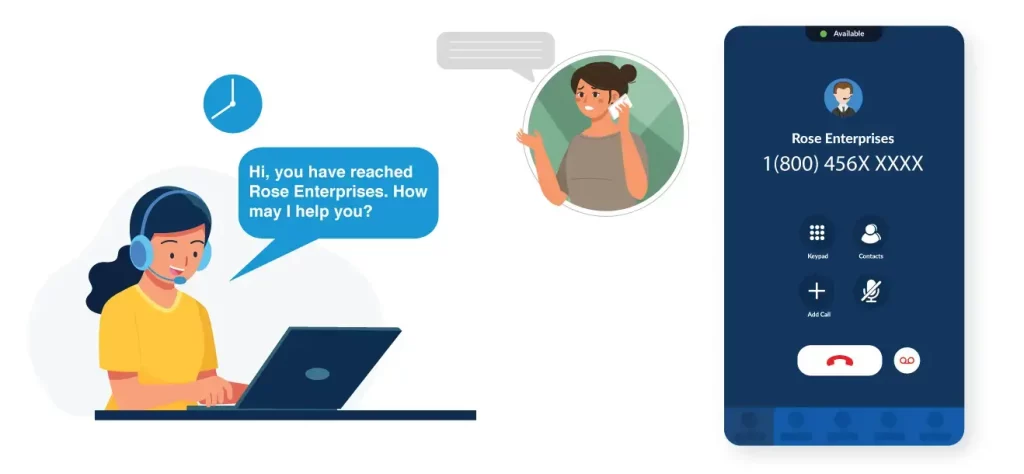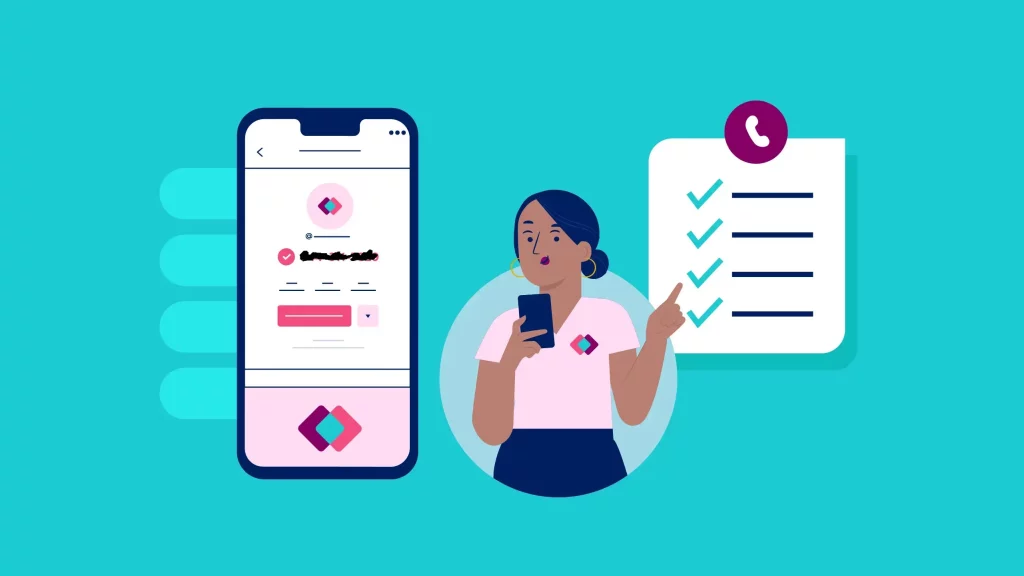Ring in the Future: How to Secure Your Business Phone Number Online

Introduction:
In today’s digital age, effective communication is critical to the success of any business. Whether you’re a startup or a well-established corporation, having a dedicated business phone number online is essential for connecting with clients, customers, and partners. In this comprehensive guide, we’ll delve into the world of acquiring a business phone number online, exploring different options, factors to consider, and steps to secure and maintain your communication channel.
Table of Contents
Ways to Obtain a Business Phone Number Online
Option 1: Virtual Phone Number Services

- What are Virtual Phone Numbers? Virtual phone numbers are cloud-based numbers that allow businesses to make and receive calls over the Internet.
- Top Virtual Phone Number Providers: Explore leading virtual phone number providers such as RingCentral, Nextiva, and Zoom Phone.
- Steps to Set Up a Virtual Phone NumberSign for a virtual phone number service, choose your desired number, and configure call settings.
Option 2: VoIP Phone Systems
- What is VoIP?VoIP (Voice over Internet Protocol) allows businesses to make voice calls using the Internet instead of traditional phone lines.
- Advantages of Using VoIP for Business CommunicationCost-effectiveness, scalability, and advanced features like call routing and voicemail transcription.
- Setting Up a VoIP Business Phone NumberSelect a VoIP service provider, set up your account, and configure your VoIP phone system.
Option 3: Mobile Apps for Business Communication
- Benefits of Using Business Communication AppsFlexibility, mobility, and integration with other business tools like CRM systems.
- Popular Mobile Apps for Business Phone Numbers Explore apps like Google Voice, TextFree, and Dingtone to obtain business phone numbers.
- Steps to Acquire a Business Phone Number through Apps: Download the app, sign up for an account, and select your preferred business phone number.
Factors to Consider When Choosing a Business Phone Number: Local Area Code vs Toll-Free Number
- Pros and Cons of Local Area Code NumbersEstablish local presence, but may limit business expansion.
- Advantages of Having a Toll-Free Business Number: Enhance credibility and increase accessibility for customers.
- You are choosing the right option for your business. Consider your target audience, business goals, and budget.
International Phone Numbers
International phone numbers allow your business to establish a presence in global markets by providing customers with a local number to call. This builds trust and credibility with international customers while saving them money on international long-distance calls.
The main drawback is the potential for higher costs associated with additional resources to manage international calls.
- Global Presence: International phone numbers enable your business to establish a presence in various countries, signaling to customers that you are accessible and available locally.
- Local Connection: By offering local phone numbers in different countries, you make it easier for international customers to reach out without the barrier of expensive international calling rates.
- Enhanced Credibility: Having local phone numbers instills trust and credibility among international clientele, as they perceive your business as more reliable and committed to serving their specific region.
- Improved Customer Experience: Providing international phone numbers enhances the customer experience by eliminating language barriers and simplifying communication for non-English speakers.
- Market Expansion: Access to international phone numbers opens doors to new markets and opportunities, allowing your business to expand its reach beyond domestic borders.
- Competitive Advantage: Offering international phone numbers sets you apart from competitors who may only provide a single domestic contact option, giving you a competitive edge in global markets.
- Flexibility and Scalability: International phone numbers offer flexibility and scalability, allowing your business to adapt to changing market demands and expand its operations as needed.
- Brand Localization: Local phone numbers contribute to brand localization efforts, making your business appear more in tune with the cultural and linguistic nuances of different regions.
- Customer Retention: Providing international phone numbers can help improve customer retention by demonstrating your commitment to serving the needs of global clientele and fostering more robust customer relationships.
- Analytics and Tracking: Utilizing international phone numbers allows for better analytics and tracking of calls, providing valuable insights into customer behavior and preferences across different regions.
Signs You’re Ready for a Business Phone Number

Do you need a business line? As a small business owner, here are nine signs you’re ready for a dedicated telephone number for your company:
- Send business calls to your mobile phone’s voicemail.
- Worry about the purpose of an incoming call.
- Missed calls when your accessible business phone number was reassigned
- Answer incoming customer calls unexpectedly.
- We need more integrations than what Google Voice offers.
- Unable to exchange text messages over your business landline
- Do you want to route calls to your business line to other team members?
- I am no longer a solopreneur and now operate a small business.
- Do not want customers to know your cell phone.
The good news is you don’t need to change your phone number.
Our guide to transferring your business number explains everything you should know about porting your number to a new provider.
To get a new phone number, follow the steps below.
Features and Pricing Plans
Additional Essential Features for Business Phone Numbers
- Call Recording: Capture meaningful conversations for training, compliance, or quality assurance purposes.
- Custom Greetings: Personalize the caller’s experience with customized greetings based on different criteria.
- Mobile Integration: Seamlessly integrate with mobile devices to ensure accessibility and flexibility for on-the-go communication.
- Unified Communications: Integrate with other communication channels, such as email and messaging platforms, for a unified customer experience.
- Analytics and Reporting: Access detailed analytics and reporting tools to track call metrics, monitor performance, and make data-driven decisions.
- Multi-Device Support: Enable users to access business phone features across multiple devices, including desktops, laptops, tablets, and smartphones.
Factors to Consider When Comparing Pricing Plans
- Usage Limits: Assess whether the pricing plan includes usage limits such as the number of minutes, messages, or users allowed.
- International Calling Rates: Evaluate the cost of international calls and determine if they are included in the plan or charged separately.
- Add-Ons and Upgrades: Consider the availability of add-on features or upgrades and their associated costs.
- Contract Terms: Review the duration and terms of the contract, including any early termination fees or renewal options.
- Support Services: Investigate the level of customer support provided, including availability, responsiveness, and additional fees for premium support.
- Scalability: Determine if the pricing plan can accommodate your business’s growth and scalability needs without incurring significant additional costs.
Tips for Selecting the Most Suitable Plan
- Identify Key Requirements: Prioritize features based on your specific communication needs, such as call volume, team size, and desired functionalities.
- Budget Considerations: Evaluate pricing plans in relation to your budget constraints and long-term financial goals.
- Trial Periods: Take advantage of free trials or demo periods offered by service providers to test the features and performance before committing to a plan.
- Seek Recommendations: Gather feedback from colleagues, industry peers, or online reviews to assess the reputation and reliability of different service providers.
- Negotiate Terms: Don’t hesitate to negotiate with service providers to customize pricing plans or secure discounts based on your business’s needs and preferences.
- Monitor Usage: Regularly monitor usage patterns and adjust your plan as needed to optimize costs and ensure alignment with your evolving communication requirements.
Integration with Existing Communication Systems
- Compatibility with Existing Phone Systems Ensures seamless integration with your current communication infrastructure.
- Seamless Integration with CRM and Other Tools Streamline workflow and improve efficiency by integrating CRM systems and productivity tools.
- We are ensuring smooth communication within the organization, including collaboration among team members and departments through integrated communication platforms.
Steps to Secure and Maintain a Business Phone Number Online: Setting Up Call Forwarding and Voicemail
- Importance of Call Forwarding and Voicemail Features: Ensure there are no missed calls and provide professional voicemail greetings.
- I am configuring call routing for business calls—routing incoming calls to the appropriate departments or team members.
- You are personalizing Voicemail Greetings for Professionalism. Create custom voicemail messages that reflect your brand identity.

Ensuring Security and Privacy
- Protecting Business Phone Numbers from Fraud: Implement security measures like two-factor authentication and call verification.
- Implementing Security Measures for Sensitive Business Calls: Encrypt voice data and enforce strict access controls to safeguard sensitive information.
- Securing Data Privacy in Communication: Comply with data protection regulations and ensure secure transmission of communication data.
- Access Controls: Implement access controls to limit who can view and manage sensitive information associated with business phone numbers.
- User Authentication: Strong user authentication methods such as passwords, biometrics, or multi-factor authentication are required to prevent unauthorized access.
- Role-Based Permissions: Assign role-based permissions to ensure that only authorized individuals have access to specific features or data within the business phone system.
- Session Management: Implement session management controls to monitor and terminate active sessions to prevent unauthorized access to sensitive information.
- Call Encryption: Encrypt voice data during transmission to prevent eavesdropping and unauthorized interception of sensitive business calls.
- Secure Protocols: Use secure protocols, such as Secure Real-time Transport Protocol (SRTP), to protect the confidentiality and integrity of voice communication.
- Call Authentication: Implement call authentication mechanisms such as Secure Telephony Identity (STI) to verify the legitimacy of incoming calls and prevent spoofing or impersonation attacks.
- Fraud Detection: Deploy fraud detection mechanisms to detect and prevent suspicious activities such as call spoofing, call hijacking, or toll fraud.
- Anomaly Detection: Implement anomaly detection algorithms to identify unusual patterns or behaviors in call traffic that may indicate fraudulent activities.
- Real-Time Monitoring: Monitor call activities in real-time to quickly identify and respond to security incidents or suspicious behavior.
- Data Protection Laws: Ensure compliance with data protection regulations such as the General Data Protection Regulation (GDPR) or the Health Insurance Portability and Accountability Act (HIPAA) to protect the privacy and confidentiality of communication data.
- Record Keeping: Maintain accurate records of communication activities and transactions to comply with legal and regulatory requirements for data retention and audit trails.
- Privacy Policies: Establish clear privacy policies and procedures governing the collection, use, and disclosure of personal information obtained through business phone communication.
- Regular Audits: Conduct regular audits and assessments of security controls and practices to identify and address potential vulnerabilities or compliance gaps.
Regular Maintenance and Updates
- Monitoring Call Quality and Service Reliability: Conduct regular checks to ensure optimal call quality and service reliability.
- Updating Contact Information and Business Details: Keep contact information up-to-date to avoid missed opportunities.
- Seeking Customer Feedback for Continuous Improvement: Ensure feedback from customers to identify areas for improvement and enhance communication effectiveness.
Frequently Asked Questions about Obtaining a Business Phone Number Online
How do I obtain a business phone number online?
- You can obtain a business phone number online by signing up for a virtual phone service provider or a Voice over Internet Protocol (VoIP) service. These services offer a range of features and pricing plans to suit your business needs.
2. What is a virtual phone service provider?
- A virtual phone service provider offers phone numbers that are not tied to a specific physical location. These numbers work over the Internet, allowing you to make and receive calls using your computer, smartphone, or other Internet-connected devices.
3. What is VoIP?
- VoIP stands for Voice over Internet Protocol, a technology that allows you to make phone calls over the Internet instead of using traditional phone lines. VoIP services offer features like call forwarding, voicemail, and conferencing at a lower cost than conventional phone services.
4. Can I choose the area code for my business phone number?
- Yes, many virtual phone service providers allow you to choose the area code for your business phone number. This can be helpful if you want to establish a local presence in a specific geographic area or if you want to match the area code of your target market.
5. Do I need to install any hardware to use a business phone number online?
- No, you typically do not need to install any hardware to use a business phone number online. Virtual phone service providers offer apps or web-based platforms that allow you to make and receive calls using your existing devices, such as a computer or smartphone.
6. Can I keep my existing business phone number when switching to an online service?
- In many cases, yes. Most virtual phone service providers offer number porting services, which allow you to transfer your existing business phone number to their platform. However, there may be some limitations or fees associated with this process, so it’s best to check with your provider.
7. Are there any additional features I can get with a business phone number online?
- Yes, virtual phone service providers offer a range of additional features such as call forwarding, voicemail transcription, auto-attendant, conferencing capabilities, and more. You can choose the features that best suit your business needs and budget.
8. How much does it cost to get a business phone number online?
- The cost of a business phone number online can vary depending on the provider and the features you choose. Many providers offer subscription-based pricing plans with monthly fees, as well as additional charges for usage or add-on features. It’s important to compare pricing plans to find the best option for your budget.
In today’s interconnected world, mastering business communication through a dedicated phone line is paramount to success. So, why wait? Get started on your journey to improved communication today!
Conclusion
In conclusion, getting a business phone number online is a crucial step for businesses looking to establish a professional communication channel. Whether you opt for virtual phone number services, VoIP phone systems, or mobile apps, prioritizing features, pricing plans, and integration capabilities is essential. By securing and maintaining your business phone number, you can enhance communication efficiency, build credibility, and foster stronger relationships with your customers and partners.






